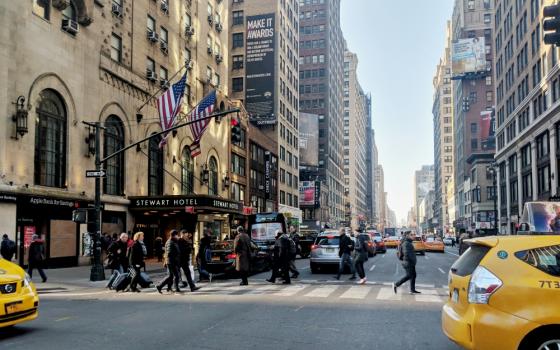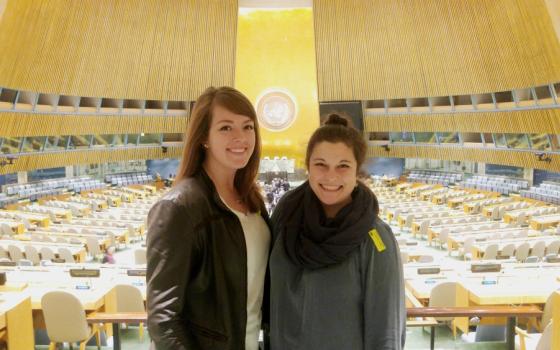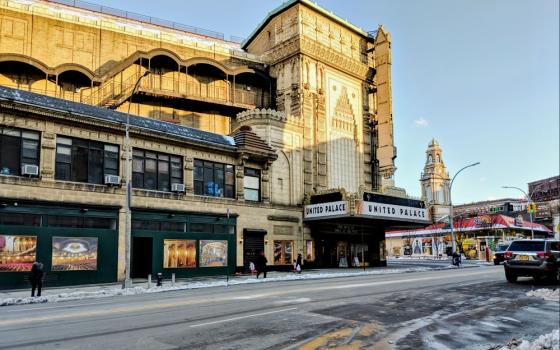Notes from the Field includes reports from young people volunteering in ministries of Catholic sisters. A partnership with Catholic Volunteer Network, the project began in the summer of 2015. This is our ninth round of bloggers: Samantha Wirth is the public policy fellow for Good Shepherd Services in New York City and Adele McKiernan is a Loretto Volunteer at Missouri Health Care for All in St. Louis.
___
My community-mates have heard me say I am a very physical person so many times they might actually groan when they read this. When I need to create something, I find inspiration most readily when my body is physically elevated, like sitting in a chair so high my feet don't touch the ground. Or when I need to focus on a tough conversation, I feel most genuine when physically grounded, sitting on the floor. When my physical being matches my mental headspace or the headspace I am looking to achieve, I find the most clarity.
Because this is a part of my identity that plays a big impact in my daily life, I am spending time reflecting on the physical stimuli that shape my headspace as we approach the 63rd Commission on the Status of Women at the United Nations.
Thanks to my first year of service, I was able to attend last year's commission, where the theme revolved around the empowerment of rural women and girls. As a native Illinoisan who grew up in a village with more cows than people, many of the conversations and workshops fell close to home.
This year, the theme will focus on social protections, public services and infrastructure and how they contribute to gender equality. Just as the themes have changed, so have I, and it just so happens that I find myself connected to this new theme in ways I wasn't before.
After leaving the rural Midwest and after my first placement living and working on a hilltop in New Jersey, life in New York City pushes an inherent dependence on functioning city infrastructure and reliable transportation to access both work and public services.
All of us in my Washington Heights community of Good Shepherd Volunteers come from places where car culture is the norm, and, frankly, lengthy commutes are a relatively new reality for us. With that adjustment comes a percentage of our day that is no longer spent in our own "safe space," driving and listening to the car radio or walking directly to our destination. We are not used to hours spent in the subway jam-packed with New Yorkers and international travelers.
That change quickly took a toll on us. Suddenly, commuting was a real signifier of transition, both physical and psychological.
In thinking about nutrition and our quest as Good Shepherd Volunteers to identify what nourishes us, I need to remember we are also nourished in other ways. My need for physical connection to be mentally connected comes out in getting ready for the day and winding down at night to help me transition into and out of the day. For example, as I get ready, I nourish my mental and emotional state by throwing open the curtains, feeling my bare feet on the hardwood floor and listening to a podcast or two. Then I take a moment to meditate — "phone, wallet, keys" — and swing the door shut behind me.
I find the clearest connection to this year's Commission on the Status of Women theme when I consider my daily dependence on sustainable infrastructure. I board my train as we commuters slide down the express track to Penn Station, and whether I'm ready for it or not, my headspace morphs as each new stimulus of the commute reaches my body.
As the doors glide open at the stops along the way, I hear echoes of saxophones or keyboards and watch old men sway to the rhythm, if just for a moment. Once arriving at Penn Station, I walk up the ramp and pass by one of the preset locations for Music Under New York performers. Most days, on the way to work, I hear brief snippets from a performer who calls herself Big Mama belting soul or I hear the sleeveless-shirt man with the steel drums playing along to "Happy" by Pharrell and interjecting a "Yeah, man" every so often.
Then it's up the steps of Penn Station and past the haze of cinnamon sugar coming from the small Auntie Anne's each morning.
These physical stimuli help me leave my "rural" safe space behind, the one my old commute allowed me to hold for much longer, and to arrive fully present at my placement. No matter where my headspace was before, I become a part of the community simply through passive engagement with my transition, whether I like it or not.
As I attend the Commission on the Status of Women events over the next two weeks, I will be bringing these sentiments with me. In all the ways that an international group of strangers are able to connect in community, we can add "individuals facing a multiplicity of transitions" to our list.
[Samantha Wirth is the public policy fellow for Good Shepherd Services in New York City.]



